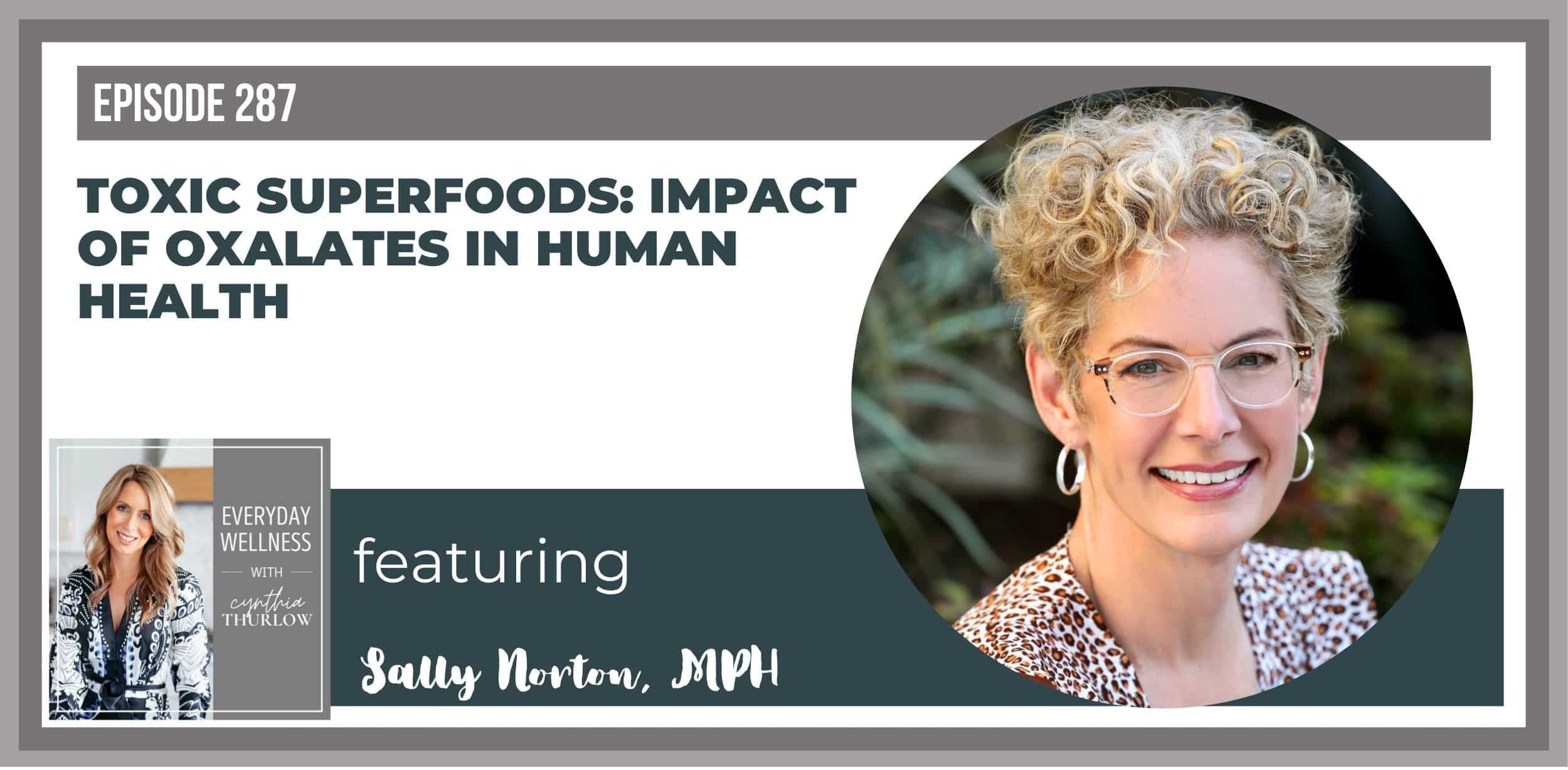Summary of Ep. 287 Toxic Superfoods: Impact of Oxalates in Human Health with Sally Norton, MPH:
*Summary:
– Sally Norton is an expert in dietary oxalates, with a background in nutrition and public health.
– Oxalates are plant-based compounds that can bind to essential minerals and disrupt the body’s balance, leading to health issues.
– Our modern lifestyles and the demand for superfoods have contributed to the prevalence of oxalates in our diets.
– Many clinicians are unaware of the impact of oxalates on health, leading to misdiagnosis and ineffective treatment.
– Sally’s book, Toxic Superfoods, provides valuable insights and guidance on how to address the consequences of consuming oxalate-heavy foods.
Step into the world of nutrition science with renowned expert Sally Norton as we explore the fascinating realm of dietary oxalates. With a nutrition degree from Cornell University and a Master’s degree in Public Health, Sally has dedicated her life to unraveling the mysteries of plant-based oxalic compounds. In her groundbreaking new book, Toxic Superfoods, she sheds light on the impact of oxalates on human health, from their affinity for essential minerals to their disruption of the delicate balance of glutathione and oxidation.
A prevalent issue in modern lifestyles is the deficiency of essential vitamins and minerals in the average American diet. This deficiency is often exacerbated by the consumer demand for so-called superfoods, which are often high in oxalates. These superfoods may be marketed as healthy and nutrient-rich, but they can have detrimental effects on our health due to their oxalate content. Unfortunately, many clinicians are unaware of how these superfoods contribute to the poor health of their patients, leading to misdiagnosis and ineffective treatment. Sally’s research and expertise aim to bridge this knowledge gap and provide valuable insights to both clinicians and individuals seeking optimal health.
So, what exactly are oxalates, and how do they impact the body? Oxalates are organic compounds found in various plant-based foods such as spinach, kale, beets, and nuts. They have the ability to bind to essential minerals like calcium and magnesium, forming oxalate salts and crystals. This binding process can lead to the depletion of these vital minerals, thereby disrupting the body’s delicate mineral balance. Additionally, oxalates have been linked to oxidative stress, which can result in tissue damage and cell death.
One striking aspect of oxalate exposure is the systemic nature of its symptoms. People who consume high levels of oxalates may experience a wide range of symptoms, including joint pain, kidney stones, digestive issues, and even longer-term chronic health problems. The root cause of these symptoms lies in the ability of oxalates to cause oxidative stress and disrupt the body’s natural processes. By understanding the impact of oxalates, we can take active steps to reduce our exposure and mitigate the potential health risks.
Our modern-day lifestyles have contributed to the increase in oxalate consumption. The rise of superfoods in response to the demand for quick and easy nutrition has led to an unintended consequence. Many of these superfoods, although touted as healthy and nutrient-dense, contain high levels of oxalates, exacerbating the issues related to oxalate overload. The key is to become informed consumers, understanding the oxalate content of our foods and making conscious decisions about our dietary choices.
An area that is often overlooked in the discussion of oxalates is the impact on genetics and lifestyle. Genetic variations can predispose individuals to be more susceptible to the negative effects of oxalate consumption. Additionally, certain lifestyle factors, such as a high-stress environment or an unhealthy gut microbiome, can increase oxalate absorption and accumulation in the body. By considering these factors, we can better understand the individualized impact of oxalates on health and tailor our approach to managing and reducing oxalate-related issues.
Addressing the consequences of consuming oxalate-laden foods requires a multifaceted approach. First and foremost, awareness and education are key. By understanding the impact of oxalates on our health, we can make informed decisions about what we put into our bodies. Additionally, optimizing our gut health and supporting our body’s natural detoxification systems can aid in reducing oxalate accumulation and minimizing oxidative stress.
It’s also important to note that not all foods containing oxalates are inherently problematic. The issue lies in the excessive consumption of high-oxalate foods without balancing them with a mineral-rich diet. Incorporating a variety of nutrient-dense foods while being mindful of oxalate content can help mitigate the negative effects of oxalates while still enjoying a diverse and delicious diet.
For individuals dealing with specific oxalate-related issues such as constipation or kidney stones, targeted strategies may be necessary. Sally’s research and book provide valuable guidance on managing these conditions and ensuring sufficient mineral intake to counteract the effects of oxalates.
In conclusion, the impact of dietary oxalates on human health is a fascinating and complex topic. Sally Norton’s expertise and research shed light on the relationship between oxalates and various health conditions. By understanding the prevalence of oxalates in our diets and the impact on our bodies, we can make more informed choices and take steps to optimize our health. Sally’s book, Toxic Superfoods, serves as a valuable resource, providing insights, guidance, and practical strategies for addressing the consequences of consuming oxalate-laden foods. Let’s embark on this enlightening journey and explore a fresh perspective on health and well-being!

